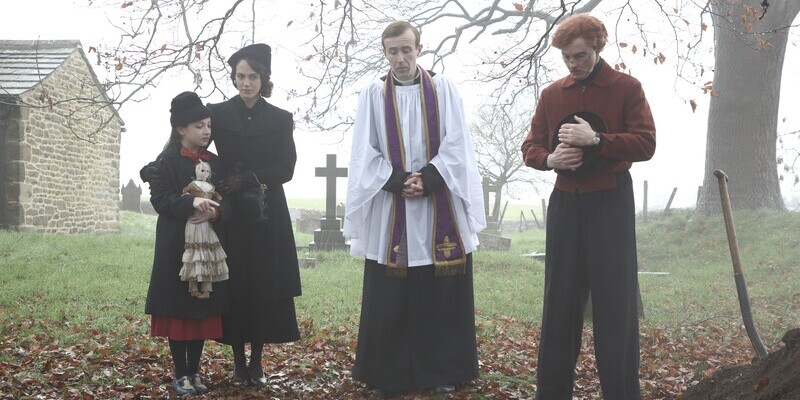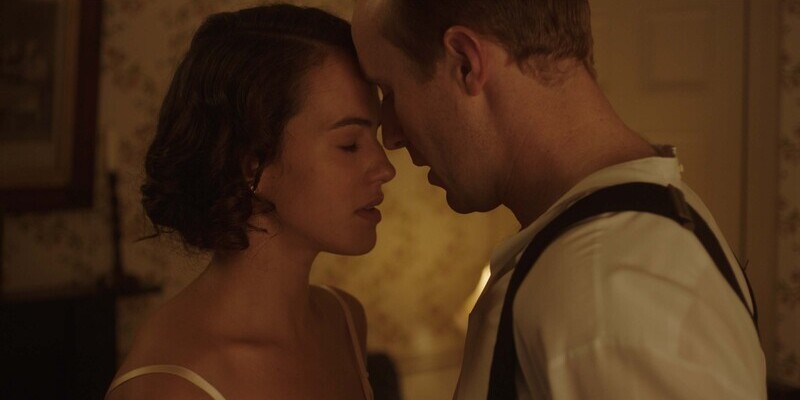
Review by
Ren Zelen
Directed by: Christopher Smith
Starring: Jessica Brown Findlay, John Heffernan, Sean Harris, John Lynch, Anya
McKenna Bruce, Jason Thorpe

The question arises in director Christopher Smith’s haunted
house film The Banishing, as to what exactly needs to be banished? Ghostly presences certainly,
but there is so much more wickedness here that is troubling and oppressing
the inmates.
Set against the backdrop of the rise of Fascism across Europe,
questionable aspects of the church, and the sins of men perpetrated upon
women, the film would seem to be a timely examination of how certain evils
infest the world, and of how little we learn from the past.
Smith has a respectable track record in horror film, having under his belt
a monster movie (Creep 2004), a period piece (Black Death
2010), a lost-at-sea mind-bender (Triangle 2009), a Danny
Dyer horror/comedy (Severance 2006) and most recently a
road-trip thriller (Detour 2016).

In his latest feature he tackles the ghost story, working from a script by
David Beton, Ray Bogdanovich and Dean Lines. The film
concerns the plight of Marianne (Jessica Brown Findlay), the new
wife of young vicar Linus (John Heffernan). She joins him in a new
parish shortly after their marriage, bringing with her a daughter,
Adelaide (Anya McKenna Bruce), a stepchild to Linus.
Marianne is full of good intentions to build a family life and be a
vicar’s wife. However, things are not as straightforward as they might
seem at first. Her husband Linus is a bundle of neuroses, too repressed
and guilt-ridden in his religious beliefs to succumb to sexual
consummation.
Likewise, it transpires that the child Adelaide has been claimed from an
orphanage where she was abandoned as a baby, and Marianne has passed her
off publicly as her sister’s child, although she insists to Adelaide that
she herself is her mother.
The prologue to the film reveals to us that dark deeds have already
occurred in the vast old house that the new family has moved into, deeds
that are being covered up by the church, as represented by the severe and
slightly menacing Bishop Malachi (John Lynch).
It seems that Bishop Malachi is at loggerheads with a local expert in the
occult, Harry Price (Sean Harris), a flame-haired, hard-drinking,
tango-dancing psychic investigator. Price knows far too much about the
house, the monastery that came before it, and the distinctly unholy acts
of the monks therein. He also has some idea of Malachi’s part in a
sinister ecclesiastical conspiracy and has been extracting information
from the local doctor, Dr. Sutter (Jason Thorpe), who is stricken
with an attack of conscience for his part in the cover up.
Price takes it upon himself to warn Linus to take his wife and stepchild
away from the cursed house, as he has been recruited under false pretenses
and told falsehoods about the family who lived there before, but Linus
chooses the believe his Bishop rather than the dubious local weirdo.

It seems that there are plenty more skeletons rattling around than just
those that Marianne might have in her closet. Soon her daughter Adelaide
begins to withdraw into a world of imaginary friends, speaking about
another ‘mummy’ and playing with an eyeless doll she has found in her
room.
Marianne too starts to notice something odd involving a mirror first found
in the basement and then in the hall. Tough as she is, but with no support
forthcoming from Linus, she begins to doubt her own sanity and urged by
her deaf housekeeper Betsy (Jean St Clair), she seeks answers from
the wild-eyed outcast Price, who had previously been unceremoniously
thrown out by her jumpy husband.
Smith utilises plenty of the usual ‘haunted house’ tropes - spooky
mirrors, sinister hooded figures, creepy dolls and a child possibly being
misled or corrupted, but they’re delivered effectively.
The Banishing may be a ghost story, but it’s also a
character drama in which everyone has to face their own personal demons.
Heffernan plays Vicar Linus as a man whose nerves are constantly close to
breaking point (we may remember his Jonathan Harker in the BBC’s recent
Dracula), while Harris goes full-on as the unnerving, tormented Harry
Price.
Grounding the film is Brown Findlay’s Marianne, a hardheaded woman trying
to subjugate her passionate nature to fulfil the role of respectable
vicar’s wife but clashing with her husband’s views of appeasement with the
Fascist threat - she says non-resistance makes the nation complicit while
he maintains that violent retaliation is inherently wrong.
Despite the veiled threats of Bishop Malachi and his raking up of her
past, she resolutely continues to seek for the truth surrounding the
previous inhabitants of the house and the monks of the monastery on whose
site the troubled house is built.

Marianne’s story becomes that of women throughout the ages, enduring the
controlling jealousy, the guilt-ridden desires, and the misogyny of men.
The events that continue to echo through the walls and corridors of her
house have happened before and will do so again, and Marianne herself is
all too familiar with the contradictory demands that patriarchy makes of
women.
Smith does a solid job in establishing a sense of malevolence in
The Banishing. He evokes familiar gothic tropes, while integrating a moral subtext
into his plot involving patriarchal injustices and political threat. How
this conflict is worked into the journey the characters take while they
wrestle with the evil in the house is well orchestrated, even if it all
never quite reaches the crescendo we are hoping for.

The Banishing is on Shudder UK/ROI now.

